


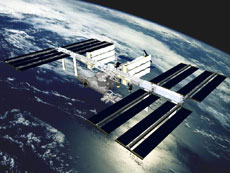
International Space Station (ISS)
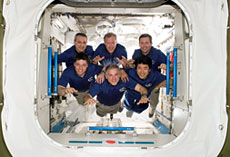
The Experiment Logistics Module - Pressurized Section (ELM-PS) of Kibo in orbit. Astronaut Takao Doi (bottom right) and other crewmembers of the STS-123. (Courtesy of NASA)
Q. Why do astronauts have to be graduates of a natural-science-related course at university?
Although some experiments are related to topics in the humanities, the main experiments performed on Kibo will be in the natural sciences, such as life science or materials science. Therefore, for astronauts, experience with scientific study and research at university is very important.
The ISS is a huge system, with about a thousand times more parts than a large airplane. To operate and maintain such a giant system, you need to demonstrate that you are able to understand complex systems. It also helps to have a love of technology and to be an experienced and confident machine operator.
Applicants must have at least three years of work experience in science and/or industry.
Q. JAXA is recruiting a maximum of three astronaut candidates to perform long-duration ISS expeditions. Are there any specific qualities you are looking for in these candidates compared to the qualities required for Space Shuttle missions? Are each of these three astronauts required to have different specialties?
We are not seeking any specific knowledge specialties among the applicants to the long-duration expeditions. The difference between a two-week Space Shuttle mission and a 3- to 6-month expedition is like the difference between running a 100-meter sprint or a 42-kilometer marathon. In the short race, you make one strong effort, but in a marathon your body must endure aerobic exercise for hours. In other words, in the short-term mission, you have to accomplish your goal by utilizing the internal storage and may even "turn off" some functions, but in the long-duration expedition, you need to operate everything normally while performing. Thus candidates for the long-duration ISS missions need to demonstrate a steady temperament and abilities in many areas.
Astronaut candidates for the long-duration expeditions need mental strength. This is needed to accomplish the required tasks for several months in the closed environment of the ISS while maintaining a commitment to good teamwork above any personal or emotional issues.
After 2009, there will be more chances for Japanese people to join long-duration expeditions, about once every 18 months. We are not seeking specialists in any any particular field because the astronauts will have to be generalists. When Japanese astronauts take part in long-duration expeditions, the team will consist of three Russians, two Americans, and one Japanese person, and all six need to be able to perform various experiments and carry out maintenance and operation of the ISS, including Japan's Kibo. Thus, even if an astronaut has a specialty, they would still need to carry out a wide range of general tasks on the mission.
Having a specialty in a specific field, however, may give a candidate experience with intense learning, and that is viewed as beneficial.
Q. It takes about 8 months from the initial application to the final selection. Why does it take so long? Have you decided how many candidates will be selected for each test stage?
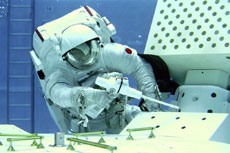
Astronaut Satoshi Furukawa participating in a technology development test for an extra-vehicular activity.
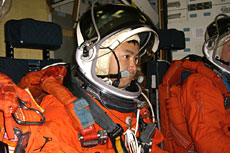
Astronaut Akihiko Hoshide training for an emergency escape from the Space Shuttle.
We would like to evaluate the aptitude of the candidates in various ways, so we will draw up a shortlist based on the candidates' qualifications, and then conduct three stages of examinations, testing qualifications, health, and psychological factors. As there is a long and steep road before astronauts can finally travel to space, they need to be mentally and physically tough, not just knowledgeable.
Successful applicants will do two years of basic training with NASA astronaut candidates. At the end of this period, they will be re-evaluated, and successful candidates will be certified as JAXA astronauts. After training in robotic arm operations and extra-vehicular activities, which is one level higher than the basic training, the new astronauts will learn the operational techniques for each system on the ISS.
It is also very important for astronauts to contribute to the development of JAXA and NASA technologies by making assessments and providing feedback from an operator's viewpoint. The astronaut's abilities will be evaluated based on their daily work and training, and then he or she will be assigned to a particular mission.
Once assigned to a mission, the astronaut will train with the other mission crew members for one to two years before finally performing the mission. Astronauts go through many steps in their training, so it becomes important to have a positive attitude, a willingness to tackle new challenges, and patience to endure long training periods. This is why the selection process takes such a long time - we need to make sure each candidate has all these qualities.
We have not decided on any specific number of candidates to be selected at each stage of testing. In previous recruitment drives, we received about 850 applications. About 200 were selected for the first-stage test, about 50 made it to the second stage, and about ten survived into the third-stage test. Of those ten, three candidates were selected for the astronaut program. It will probably be about the same this time.
Q. What qualities do you think are important for an astronaut?
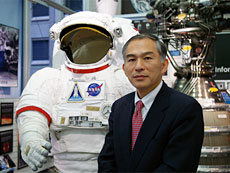
To operate and maintain a huge system like the ISS, applicants need to start with a broad knowledge base, but also must be extremely willing to continue to expand their own abilities as much as possible through training. Flexibility is very important for astronauts, who will enter a completely new world with new and unexpected circumstances. They must be able to absorb and process new information very rapidly.
In order to promote cooperative work on an international team, it is also important to communicate with everyone freely, take a leadership role when appropriate, to know when to follow others without argument, and to have self-control and consideration for the team. Specifically, I would like to stress the ability to cooperate, adapt, and remain emotionally stable.
Because astronauts go to the ISS as representatives of Japan, I would like them to share information about Japan with their fellow astronauts on an international team. I also want astronauts to be good communicators, so they can share their experiences with the Japanese public when they return to Earth. In this sense, applicants are required to have a sophisticated but clear command of the Japanese language. As JAXA astronauts will be the face of Japan, I hope they serve as good representatives, and I expect them to return with various positive results for the nation.
Koji Yanagawa
Director of the Human Space Technology and Astronaut Department, JAXA Human Space Systems and Utilization Mission Directorate
Mr. Yanagawa graduated from the Department of Physics at the Graduate School of Advanced Science and Engineering, Waseda University, in 1977. He joined the former National Space Development Agency (now part of JAXA), and participated in the development of the H-I Launch Vehicle's second-stage LE-5 engine. He also participated in many experiments on Space Shuttle missions. In 1998, Mr. Yanagawa was posted to JAXA's Houston office. In 2001, he returned to the Human Space Technology and Astronaut Department.
Director of the Human Space Technology and Astronaut Department, JAXA Human Space Systems and Utilization Mission Directorate
Mr. Yanagawa graduated from the Department of Physics at the Graduate School of Advanced Science and Engineering, Waseda University, in 1977. He joined the former National Space Development Agency (now part of JAXA), and participated in the development of the H-I Launch Vehicle's second-stage LE-5 engine. He also participated in many experiments on Space Shuttle missions. In 1998, Mr. Yanagawa was posted to JAXA's Houston office. In 2001, he returned to the Human Space Technology and Astronaut Department.
In Search of the Unknown Frontier
Going to Space as a Representative of Japan
An Intense Passion to Work in Space
Going to Space as a Representative of Japan
An Intense Passion to Work in Space